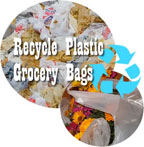
Recent reports on the Great Pacific Garbage Patch indicate that there is a
floating garbage dump in the North Pacific Ocean that is twice the surface area
of the United States and 30 feet deep. The amount of plastic garbage in the
Pacific Ocean has tripled over the past ten years and is expected to double over
the next decade.
The most obvious way to reduce this “trash continent” is to significantly cut
down on our use of plastics and ensure that those we use are processed for
recycling. But what can be done about the 100 million tonnes of plastic that are
already there?
Enter Daniel Burd, a high school student from the Waterloo Collegiate Institute
in Ontario. He recently won the top prize at the Canada-Wide Science Fair in
Ottawa for finding a natural way to recycle plastic bags.
Applying the scientific method in a very simple, yet ingenious way, Burd figured
out how to accelerate the natural process behind the degradation of plastic. He
was able to identify two micro-organisms that “eat” plastic and recreate the
conditions required for this natural process to work.
Based on the results of his experiment, it should take only about three months
to break down plastic bags. The process requires very little energy because the
microbes themselves generate heat as they work, and the waste produced is water
and very small levels of carbon dioxide.
This situation serves as a potent example of the power of the natural world and
how this power can be applied to the benefit of humanity and the Earth. What is
waste in one cycle can be a source of fuel in another. In all of the systems
humans develop, would it not be wise to see how the “waste” we produce can be
directed into another system that uses it as fuel, thereby eliminating an
accumulation of “garbage” and pollution?